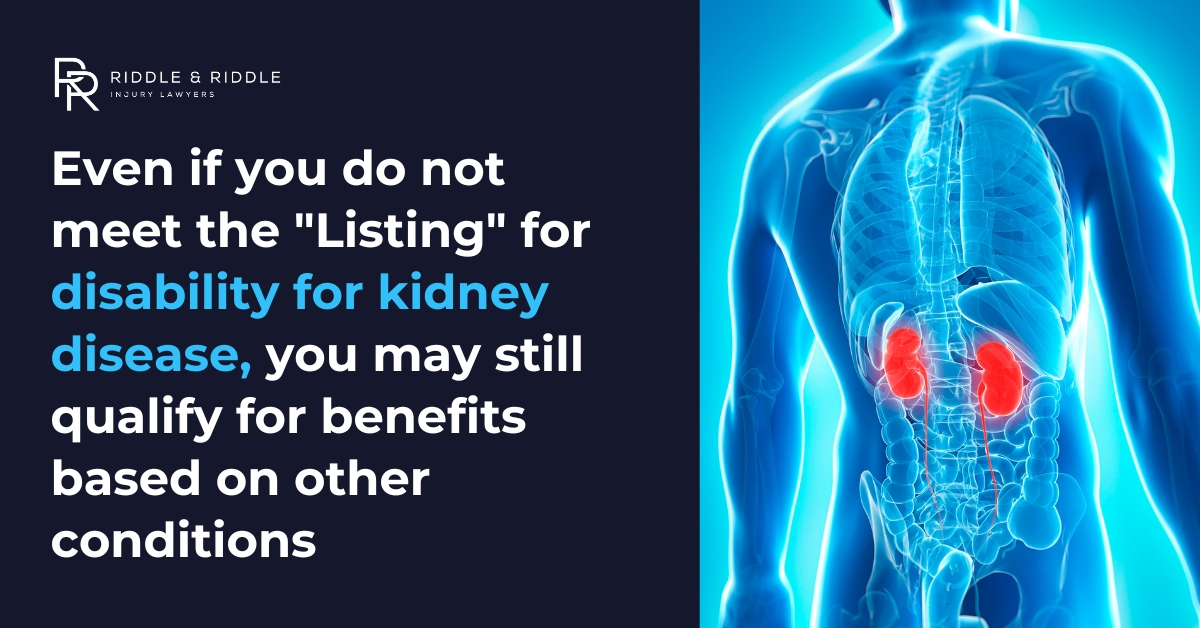Riddle & Riddle Injury Lawyers | September 25, 2020 | Social Security Disability

Chronic kidney disease (CKD) affects around 14% of the general population. As such, many of our clients ask us, “Can I get disability for kidney disease?”
In this blog post, we’ll take a look at chronic kidney disease and examine how to qualify for Social Security disability for kidney disease.
For a FREE consultation with an experienced disability lawyer handling disability for kidney disease claims, please call 1-800-525-7111.
What is Chronic Kidney Disease?
Two of the primary contributing factors to a person developing CKD (kidney disease) are high blood pressure and Type II diabetes, both of which are on the rise as the U.S. population becomes increasingly overweight. When kidney disease progresses to a certain point, it can result in the need for dialysis and eventually a kidney transplant. Even before that, symptoms of chronic kidney disease can include frequent urination, fatigue, swelling of the hands and feet, nausea, muscle cramps, and sometimes a noticeable darkening of the skin.
These symptoms can be severe enough to keep a person from working and qualify him or her for disability for kidney disease.
Disability for Kidney Disease: How to Qualify
The Social Security Administration (SSA) recognizes that kidney disease symptoms and treatments can, by themselves, be so limiting as to render a person disabled, so they have a category in their Listing of Impairments specifically for CKD sufferers.
Not only that, but in most cases, a chronic kidney disease sufferer also suffers from other medical conditions that impair their ability to work. When a person with CKD does not meet the technical requirement of the Listing, he or she can still be approved for disability benefits if their “residual functional capacity” or RFC (i.e. what you can still do despite your impairments) is significantly impaired from the combination of all their medical conditions.
There are two treatment protocols for CKD that automatically qualify one for disability for kidney disease:
- Dialysis: If your CKD progresses to the point you need dialysis to cleanse your blood (because your kidneys no longer can), you automatically qualify as “disabled” if the dialysis has been done, or will need to be done (as certified by a doctor), for at least a year.
- Transplant: If your CKD results in you getting a kidney transplant, a specific provision in the Listing provides that you automatically are considered “disabled” for one year after the transplant procedure. This is primarily because the anti-rejection medications taken by all kidney transplant recipients severely limit what they can do and what they can be exposed to. If your body accepts the transplant and otherwise recovers during that year, your period of disability will end and your entitlement to benefits will cease unless other conditions are severe enough to keep you from working (see below). For instance, many transplant recipients (because of the anti-rejection medications) develop other infections or conditions bad enough to prevent them from engaging in full-time employment. For those folks, their benefits will be continued unless and until ALL of their disabling conditions improve to the point they can work.
Other Ways to Qualify for Disability for Kidney Disease
In addition to these two treatment protocols for CKD, you can also meet the Listing by proving certain other conditions via medical testing, including osteodystrophy (bone degeneration), peripheral neuropathy, anorexia, and several others. As with all Listings, the requirements are very specific and detailed, and they must be fully and completely met in order to be found “disabled” under this Listing.
If your CKD is severe enough to cause you significant problems with your day to day life but not severe enough in the specific ways that must match the requirements of the Listing, you can still be awarded benefits by proving that your RFC is so limited that you could not work much if at all no matter how simple or easy the job. You can prove this by showing other physical or mental health problems that, in combination with your CKD, limit you so much that you cannot work.
For example (as mentioned above), many if not most people with chronic kidney disease also have high blood pressure or Type II diabetes, and very often these overwhelming physical problems are accompanied by depression and anxiety from having to deal with them. The symptoms from all these conditions, when viewed together, may very well prevent you from doing what needs to be done to complete a full workday. If the SSA or an Administrative Law Judge concludes that this combination of impairments limits your RFC so severely that few if any jobs could accommodate your limitations, you can be approved for benefits even though you do not meet the CKD Listing.
Are You Seeking Disability for Kidney Disease?

If you suffer from chronic kidney disease (CKD) and are seeking Social Security disability benefits, an experienced disability attorney can help.
Winning disability for kidney disease benefits can be a complicated and time-consuming process, and our North Carolina disability lawyers would love to help however they can.
For a FREE consultation with a disability lawyer handling claims for disability for CKD, please call 1-800-525-7111.
There is no obligation and because we work on a contingency basis, you won’t pay any attorney fees unless we win your case and you receive Social Security disability for kidney disease.
Call 1-800-525-7111 to speak with an experienced disability attorney handling claims related to kidney disease.
For a FREE, no-obligation consultation concerning your claim for disability for kidney disease, please call 1-800-525-7111.
We will review your claim, advise you on your options for a claim or appeal, and if you decide to hire us, we will fight tirelessly for your right to benefits.
Call 1-800-525-7111 today and let’s review your claim for disability for CKD (kidney disease).
Justice Counts for North Carolinians unable to work due to disabilities and we would love to help however we can.
Contact a Personal Injury Lawyer from Riddle & Riddle Injury Lawyers for Help Today
For more information, please contact Riddle & Riddle Injury Lawyers to schedule a free consultation with a personal injury lawyer in North Carolina today. We have twelve convenient locations in North Carolina, including Greenville, Raleigh, Goldsboro, Jacksonville, Kinston, Charlotte, Greensboro, Durham, Fayetteville, Wilmington, Winston-Salem & Garner.
Riddle & Riddle Injury Lawyers – Raleigh Office
4600 Marriott Dr STE 500, Raleigh, NC 27612
(919) 876-3020
Riddle & Riddle Injury Lawyers – Charlotte Office
1914 J N Pease Pl Suite 142, Charlotte, NC 28262
(704) 486-5824
Riddle & Riddle Injury Lawyers – Durham Office
100 E Parrish St STE 200, Durham, NC 27701
(919) 728-1770
Riddle & Riddle Injury Lawyers – Garner Office
500 Benson Rd Suite 111, Garner, NC 27529
(800) 525-7111
Riddle & Riddle Injury Lawyers – Greensboro Office
7B Corporate Center Ct Suite 15, Greensboro, NC 27408
(336) 516-9066
Riddle & Riddle Injury Lawyers – Greenville Office
300 E Arlington Blvd Suite 2A #110, Greenville, NC 27858
(252) 397-8620
Riddle & Riddle Injury Lawyers – Goldsboro Office
601 N Spence Ave, Goldsboro, NC 27534
(919) 778-9700
Riddle & Riddle Injury Lawyers – Jacksonville Office
3391 Henderson Dr, Jacksonville, NC 28546
(910) 455-5599
Riddle & Riddle Injury Lawyers – Kinston Office
807 N Queen St, Kinston, NC 28501
(252) 397-8624
Riddle & Riddle Injury Lawyers – Fayetteville Office
2517 Raeford Rd, Fayetteville, NC 28305
(910) 387-9186
Riddle & Riddle Injury Lawyers – Wilmington Office
1608 Queen St Suite 12, Wilmington, NC 28401
(910) 889-4064
Riddle & Riddle Injury Lawyers – Winston-Salem Office
102 W 3rd St, Ste 1007, Winston-Salem, NC 27101
(336) 516-9042
